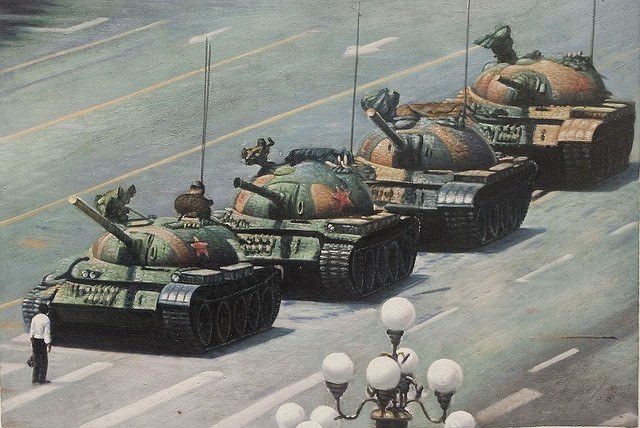
By Natalia Maria Vaile
On June 4th 1989, Chinese troops armed with full military force barreled through Tiananmen Square in Beijing and flattened unarmed Chinese student and civilian protesters opposing China’s economic austerity measures. In the aftermath of the massacre, a lone man stood up against a several tanks in defiance of the military presence that terrorized his community. The courage of this hero, whose identity still remains unknown, affected the world. Tank Man serves as an icon representing the common man standing against authoritarianism.
The decades after Tank Man and the Tiananmen Square Massacre yielded an economic miracle unmatched in human history. Chinese leaders loosened fiscal austerity measures. In a new burgeoning economy the urban Chinese, like the new residents surrounding Tiananmen Square, saw greater distribution of wealth. In the past decade, citizens increasing access new information technology paralleled the dramatic economic upswing as demonstrated in the graph below:

So what does the new elite and middle class think of the Chinese superhero that stood up against totalitarian brutality 23 years ago? In a Frontline documentary, The Tank Man, students at the University of Beijing were shown pictures of the aftermath of Tiananmen Square and of Tank Man and asked what these photos meant to them. These were their reactions:
What if Tank Man could Tweet?
Though a new elite and middle class can now access information from the best electronics money can buy, China still suffers from a stifling single party rule.
Censors have go so far as to blacklist consecutive string of the numbers 6, 4, and 8 related to the Tiananmen massacre. For these university students, the Internet architecture in China has successfully deflected access to such “incidents” which cast China’s one party dominance in an unflattering light.
After Western policy makers attributed the 2009 Iranian Green Movement to Twitter in recent years, they have celebrated the Internet as an instrument of liberation against authoritarianism. When Google had threatened to pull out of China in 2010, many speculated a reaction to censorship policies, the US Secretary of State Hillary Clinton trumpeted the promise of “Internet Freedom” as a US foreign policy objective. She stated this would support “peace and security that will provide a foundation for global progress” and such freedom could “advance democracy and human rights.”
Following this logic, if citizens had greater access to Internet content, the Beijing University students, typically the most likely to fight for democracy, may become inspired with the zeitgeist of Tiananmen Square. The Internet could facilitate coordination and a vision of democracy capable of usurping one party rule. Could Internet liberation collapse the same authoritarianism Tank Man made a stand against?
Dzyen for the day: Feeding the Hand that Bites You
This “cyber-utopian” view celebrated by Western policy makers, according to Evgeny Morozov, is not only naive but also dangerous. He posits in The Net Delusion that allowing greater access to the Internet to bring about democracy is an oversimplified, one size fits solution that does not address any or all geopolitical environments. Morozov cites historical evidence of man against authoritarian events and concludes that greater access to digital media will harbor censorship, propaganda, and surveillance: what he dubs the three main pillars of authoritarian control. In other words, Internet determinists are not taking into account that closed societies, such as China, would respond to “Internet Liberation” with further austerity prowess on its citizens. The evidence of authoritarian adaptation to digitalization is already becoming history.
On October 26th the New York Times reported a push by public security chief Zhou Yongkang to “solve problems regarding social integrity, morality, and Internet management.” The Economist in March 17th reported than in an effort to control the spread of information in the closed society Chinese leaders are now requiring micro-bloggers, a 250 million user market, to register with real name identification in order for outsource technology companies to trace messages and users that Chinese leaders may find nefarious.

These recent historical events show that while Internet usage has swelled, it has become a tool of regime strengthening, not citizen liberation. Gauging from the defensive reactions of Chinese leaders to new forms of digital expression, it is easy to see why they have tried to delete Tank Man. The PBS Tank Man documentary observes “ has made Tank Man disappear, and if another were to emerge, that technology could facilitate a swift arrest.”
Cyber Repression in China’s Future
Because of China’s dictatorship, we will never know for sure who Tank Man was and what happened to him. His identity has effectively been deleted. He has, however, endured as icon indicating the beginning of the end of the Cold War.
Could he inspire again? In a similar confrontation between the Tank Man and the military column, it seems as if the dissident Chinese blogger faces monolithic techno-totalitarianism were more access to the Internet is counteracted by iron clad Chinese political austerity. So is China condemned never to revive Tank Man’s legacy.
Here’s a clue, look at the language in the comments:
https://www.youtube.com/watch?v=pe87HTYbR8Q
Tank Man’s act of defiance against authoritarian brutality will endure, and cannot be deleted. Morozov, though he dispels the myth of the Internet remedy of all ills, he recognizes that digitalization has changed a lot of how we live but not who we are: “Technology changes all the time; human nature hardly ever.”
Cyber Repression in China Sources
- Morozov, Evgeny. The Net Delusion: The Dark Side of Internet Freedom. New York: Public Affairs, 2011
- Antony , Thomas, prod. “The Tank Man.” Front Line. PBS: 11 Apr 2006. Television.
- Mcdonald, Mark. ‘Watch Your Language! (In China, They Really Do)’ The New York Times, March 13, 2012.
- https://rendezvous.blogs.nytimes.com/2012/03/13/watch-your-language-and-in-china-they-do/
- Lafraniere, Sharon, Wines, Michael, and Wong, Edward. ‘China Reins In Entertainment and Blogging’ The New York Times, October 26, 2011.
- https://www.nytimes.com/2011/10/27/world/asia/china-imposes-new-limits-on-entertainment-and-bloggers.html
Marlocom says
to sign up for, chances are that using Swagbucks will save you money or
how to save money fast